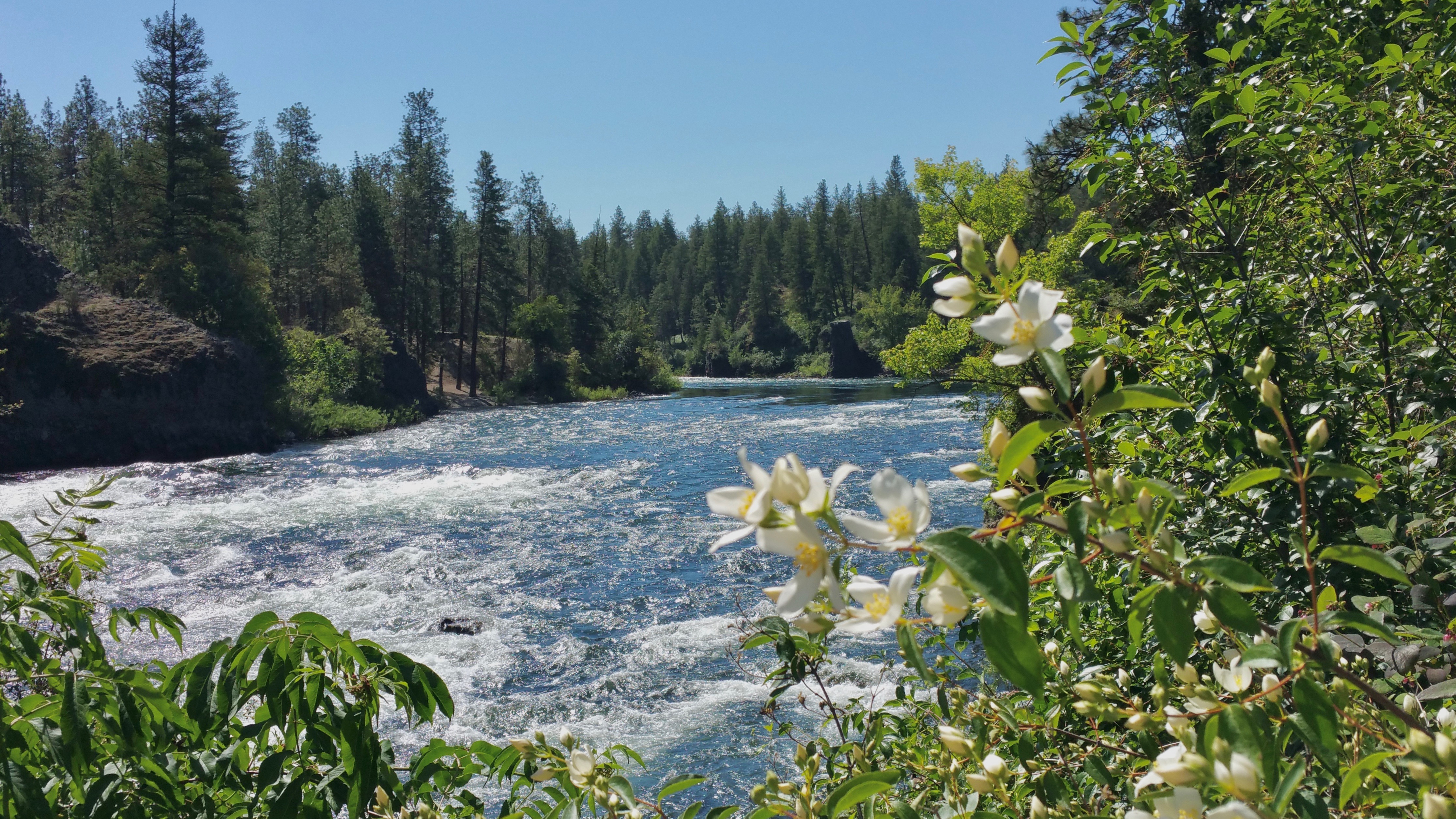
Spokane River with flowering syringa flowing in the canyon of Riverside State Park. The State Park is below the City of Spokane and the outflow pipe for the City's sewage treatment plant, a source of PCBs polluting the river. Further downstream is the reservation for the Spokane Tribe of Indians, a fish-eating tribe. Photo credit: Upper Columbia River Group, Sierra Club
By John Osborn MD, Spokane River Team, co-coordinator
On December 1 in the Federal Register, the U.S. Environmental Protection Agency (EPA) published its settlement with Sierra Club, committing the agency to prepare a cleanup plan for cancer-causing PCBs that severely pollute the Spokane River. For the River and life that depends on it, this settlement caps 25 years of advocacy, including 10 years of litigation filed by Sierra Club, the Center for Environmental Law & Policy, and intervener Spokane Tribe of Indians. Our lawsuit sought to enforce the Clean Water Act mandate for an EPA cleanup plan, which was necessary due to decades of inaction by the State of Washington.
PCBs are dangerous chemicals that harm aquatic and human life. Tiny amounts of the toxin become more concentrated as it moves up the food chain, which leads to cancer and other diseases. The Washington Department of Health’s public health advisory, issued many years ago and still in effect, warns against consumption of PCB-contaminated fish in the Spokane River.
Currently, PCB manufacture is banned in the U.S. Most PCBs entering the Spokane River pre-date the ban, with one major exception: Inland Empire Paper Co. (IEP) recycles paper printed with imported inks that contain PCBs.
In addition to IEP, Kaiser Aluminum and the Liberty Lake, Spokane County, and City of Spokane wastewater treatment plants each discharge PCBs to the river. All five discharge pipes are permitted by the Washington Department of Ecology (DOE), but these permits contain no limits on PCBs flowing into the Spokane River.
However, under the settlement, called a “Consent Decree,” the EPA will complete a Total Maximum Daily Load (TMDL) by September 2024. A TMDL is a science-based pollution cleanup plan. This one will be designed to ensure that the Spokane River meets protective water quality standards issued by Washington state and the Spokane Tribe.
The TMDL will require significant reductions in PCB pollution discharged to the Spokane River by the five industrial and municipal treatment plants located in Washington. This is especially significant because of heavy use of the Spokane River by the public for recreation and the consumption of fish. A PCB TMDL will allocate wasteload to the river polluters through NPDES permits that protect the river rather than polluters.
The settlement includes a 30-day public comment period. We need you to speak up and demand a science-based TMDL that will rid the River of cancer-causing PCBs. Backed by public support, Sierra Club, et al will then present the settlement to the federal court for final approval.
Sierra Club and CELP are represented by Marc Zemel and Richard Smith of Smith & Lowney PLLC, a Seattle law firm specializing in Clean Water Act litigation. The Spokane Tribe of Indians is represented by Ted Knight.
Take Action and help a distressed river!
Deadline is January 3, 2022.
Click here to write your comment: https://www.regulations.gov/commenton/EPA-HQ-OGC-2021-0828-0001
Consider making the following point in your own words:
-
Most importantly, thank EPA and express your support for preparation of the PCB cleanup plan. Public uses require a clean river.
-
Insist that the cleanup plan be based on sound science.
-
Ask EPA to use state-of-the-art testing technology to measure PCBs.
-
As a matter of human health and environmental justice, ask EPA to ensure that the cleanup plan complies with applicable water quality standards.
The Spokane River Team is a project of Sierra Club’s Upper Columbia River Group with state chapter support. We are represented by Marc Zemel of Smith & Lowney, a Seattle firm specializing in Clean Water Act litigation.
Contact Sierra Club’s Spokane River Team for further questions:
- John Osborn: john@waterplanet.ws
- Kathy Dixon: kathleengdixon@gmail.com
- John Allison: jdallison@eahjlaw.com
- Tom Soeldner: waltsoe@allmail.net
- Rachael Osborn: rdpaschal@earthlink.net